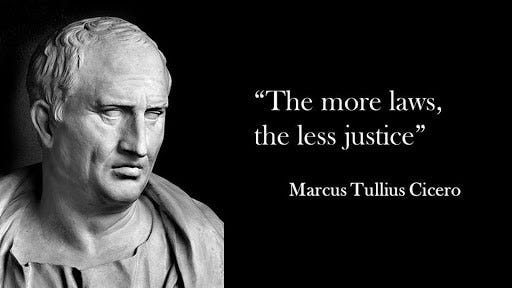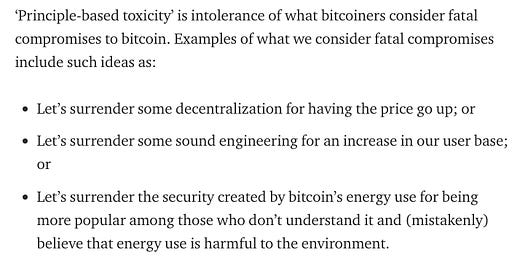

Discover more from The Freedom Analects
Our Most Brilliant Idea (Part 2)
Exploring humanity's greatest idea historically, and its novel form in modernity.
Free Markets are Free Thinking
“Man’s mind, once stretched by a new idea, never regains its original dimensions.”—Oliver Wendell Holmes
Contrary to popular misconception, money is not a government creation. Money is emergent—it is simply the most tradable good in any given market. As people seek to satisfy their wants through trade, they steadily seek to trade their goods for more tradable goods to get closer to obtaining the object(s) they desire. As this process unfolds, a certain asset gains the highest liquidity—whether it is salt, cattle, or gold—this most exchangeable good is (by definition) money. Money, then, is an inexorable outcome of free trade.
As global markets converged, they coalesced around precious metals as money due to their superior monetary properties of durability, divisibility, portability, recognizability, and scarcity. Gold—which excelled all other metals in scarcity—became the dominant money of the world precisely because its supply was the least changeable. Central banks eventually coopted gold and built a pyramid scheme on it called fiat currency. When central banks monopolized the market for money, it became unfree. Violating free market capitalism, as Soviet Russia learned the hard way, is a really bad idea—it runs countervailing to the natural human proclivity for trade, ideation, and wealth generation. As Marcus Aurelius poeticizes our capacity for collaboration:
“We were born to work together like feet, hands, and eyes, like the two rows of teeth, upper and lower. To obstruct each other is unnatural.”
Clearly, obstructing the ability of market participants to express their ideas through trade is a breakdown in the “rules” of capitalism. All frictions on free trade are dissipative to both innovation and wealth creation. A true capitalist society necessitates unbreakable rules of trade such as equitable rule of law, inviolable private property rights, and unstoppable honest money. In such a pure capitalistic system, individuals would have no way to create value for themselves other than giving society what it wants (even if its wants are as yet unarticulated). But our over-regulated world today is a far cry from this ideal.
*Learn from the experts at IBAC what role Bitcoin plays as an emerging investable asset, in the preservation of long term wealth*
IBAC helps sovereign institutions succeed with Bitcoin: https://www.ibac.io/
All regulations are limitations on free market forces that constrict ideation and its physical manifestation: wealth creation. The ultimate expression of legal regulation is monopolization, in which all peaceful competition is suppressed through coercion or violence. In the world today, the market for money is not a free market, as it is forcibly dominated by cartels of central banks — legal monopolies that distort prices, reduce trade, and interrupt ideation. Tellingly, central banking was also a key component of Soviet communism—an exclusive state-owned banking monopoly was the 5th measure in Marx’s 1848 Manifesto to the Communist Party. True capitalism has never existed, precisely because the rules of money have always become twisted by interventionists pursuing their own pecuniary gain in every market known to history. Legal impediments erected by governments to insulate central bank monopolies on money from free market capitalism are manifold. Such artifice destroys accountability, ingenuity, and virtue.
With unbreakable capitalistic rules, the “game” of macroeconomics would impose an organizing principle onto humanity, encouraging us to find better ways of saying, doing, or making things by betting against each other in the marketplace as opposed to lying, stealing, or taxing. When rules cannot break, play is fair, and want-satisfactions escalate. As “players” prove one another wrong in the marketplace—by discovering and selling better means of satisfying wants—the resultant productivity gains diffuse into society through trade.
*Join me at the biggest event of the year, Bitcoin 2022. See below for 10% discount on tickets*
“Bitcoin 2022 Conference is the biggest gathering of the Bitcoin ecosystem in the world. Join me and the movers and shakers shaping the Bitcoin future next April 6-9th in Miami Florida for Bitcoin 2022 Conference.”
Paying with Fiat? 10% Affiliate link: http://tixr.com/pr/robertbreedlove/26217
Paying with Bitcoin? Use promo code: BREEDLOVE.
An environment conducive to continuous learning at scale is cultivated through capitalism. Said differently: when ideas compete freely, more wealth is created—most often in the form of better tools, services, or knowledge. Mises describes this inextricable relationship between ideation and market competition in his masterwork Human Action:
“But competition does not mean that anybody can prosper by simply imitating what other people do. It means the opportunity to serve the consumers in a better or cheaper way without being restrained by privileges granted to those whose vested interests the innovation hurts. What a newcomer who wants to defy the vested interest of the old established firms needs most is brains and ideas. If his project is fit to fill the most urgent of the unsatisfied needs of the consumers or to purvey them at a cheaper price than their olde purveyors, he will succeed in spite of the much talked of bigness and power of old firms.”
To use Ray Dalio’s term: free markets are idea meritocracies: unhampered trade networks that incentivize the cultivation and infusion of the best ideas into civilization. Implicit in the meta-idea is the presupposition innovation can only be nurtured, not legislated. Here, the ignorance of MMT advocates clamoring for “the activation of idle capital through inflation” rears its head: proceeds from theft via inflation can mobilize people and capital, but only in an unintelligent way since bureaucrats lack both the accountability and distributed computing power endogenous to the free market, and only until this parasitization of value from the productive economy kills it. In simple economic terms: free markets make mankind more productive; monopolies, or unfree markets, make mankind less productive. Further, the condition of our collective mind closely mirrors the state of our money. We only think in dollars today because they were once redeemable for gold. Central banks have hijacked the monetary extensibility of our minds (the old “bait and switch” tactic), and corrupted our capacity to perceive the world clearly:


Free minds need freely selected money. By embracing a free market paradigm in the totality of our actions we become more free thinking, intelligent, and wealthy. Another way to think about the free market is as a system of error detection and correction: through prices, it incentivizes the discovery and resolution of unsatisfied wants (socioeconomic errors). Central bank induced inflation distorts this error correction system, and causes dissatisfactions to swell. This market manipulation is (ostensibly) justified by the self-deceptive intentionality of central bankers to “manage the economy,” as if any human had ever successfully managed any complex system without triggering a cascade of unintended consequences.
*Looking to earn yield on some of your long-term Bitcoin holdings? Try Tantra Labs*
Put your Bitcoin to work. Earn up to 12% interest back on Bitcoin with Tantra: Start Earning Today
Conviction in the utility of their necessarily limited knowledge, as opposed to the free market processes which continually revivify knowledge, is the black core of central bank malevolence. As John Milton, author of Paradise Lost, brilliantly observed:
“Evil is the force that believes its knowledge is complete.”
Central banks could repent merely by admitting this gargantuan error in ideology, and letting the free market clear its 100+ years of errors. This would be painful at first, but undoubtedly in the long-term best interests of civilization—like a drug addict finally entering rehabilitation. But hubris and greed will almost certainly prevent such an ideal outcome. To summarize the argument: free market pricing is an error-clearing system, and central banking ameliorates its capacity for error detection and correction; acting as if its knowledge of markets is complete, central banking is evil incarnate—an institution of economic tyranny as misguided as Soviet Russia. In the ideological sphere, freedom is as creative as tyranny is destructive.
Thank you for reading Our Most Brilliant Idea (Part 2).
PODCAST
SOCIAL
SUPPORT
Send Bitcoin to my PayNymID: +tightking693
RECOMMENDED BUSINESSES
Subscribe to The Freedom Analects
Written works exploring truth, power, freedom, money, economics, virtue, sovereignty, philosophy, and other enigmas of existence.











